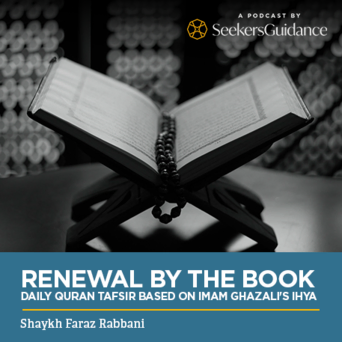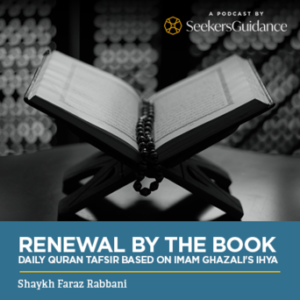06-Hajj- Renewal by the Book- Shaykh Faraz Rabbani
: Play in a new window | Download to your device (11.7MB)
In this re-broadcasted lesson, Shaykh Faraz Rabbani looks at the key verses in the Quran related to Hajj, corresponding to the seventh chapter of Imam Ghazali’s Ihya. He highlights the verses 27-32 from Sura Al-Hajj, which outline the meaning and purpose of Hajj. “Proclaim the pilgrimage to all people, they will come to you on foot and they’ll come on all kind of mount emerging from every deep mountain pass. In order to witness all kinds of benefits for them and in order to remember the name of Allah for a known number of days for what Allah has provided for them. So feed yourself of that livestock and give to feed the destitute and the unfortunate… “ [Quran, 22:27-28] In these verses Allah tells us some of the spiritual aims of Hajj.
The Pilgrimage has many acts of worship each of which has its own benefits. Each act is done out of submission to Allah and to the extent to which it is done with that intention you will find benefit in it. People with respect to Hajj are of 3 types: [1] Those who go to Hajj unprepared and that is foolishness, they gain some benefit but miss out on a lot. [2] Those who prepare outwardly only for the Hajj, and that is important. [3] Those who prepare outwardly but also understand why they are doing it. One should prepare well advance to Hajj. One of the highly recommended resources for this is Imam Ghazali’s Chapter on Hajj (or as translated in the book Inner Dimensions of Islamic Worship) that details the spiritual benefits of Hajj.
Imam Al-Ghazali describes Hajj as a reenactment of resurrection and the Hereafter or as a reenactment of the various challenges of life. The metaphor of tawaf is a metaphor of love so throughout our day we keep turning towards the One we love through prayer. However, the believer wants to express more fully the nature of their love to Allah and the Hajj expresses that. “So let the pilgrims perform their acts of cleansing, fulfill their vows, and circle around the Ancient House.” “All this [is ordained by God]: anyone who honors the sacred ordinances of God will have good rewards from His Lord…” [Quran, 22:29-30] In these verses Allah reminds us that this is a devotional act and that we are servants to Allah as such we carry out the acts of devotion in the way He ordained not in the ways we prefer. “Steadfastly upright for Allah, not associating any with Him.
In this series, Shaykh Faraz will be looking at points of reflection from key verses in the Quran. The series will follow the thematic order of Imam Ghazali’s Ihya Ulum al-Din (Renewing the Religious Sciences). The aim is to connect the key verses of guidance from the Book of Allah with the blueprint of renewal, the Ihya, so that we experience a renewal by The Book.

